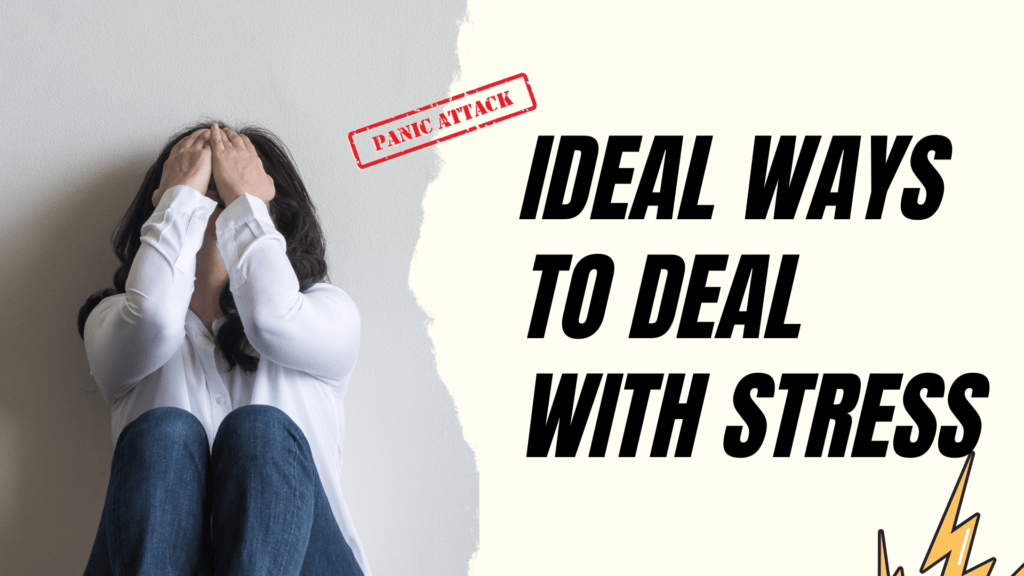In this well-researched blog, you will learn types of stress and stress management methods. These are proven methods and worldwide accepted.
Stress! is a feeling we all experience. It’s impossible to eliminate stress but we can learn to manage it effectively. When you face changes or challenges (stressors), your body reacts physically and mentally to stress.
We’ll explore simple stress relief methods that effectively regain balance and inner peace.

Imagine, you’re stuck in traffic, running late for an important meeting. Your heart races and your mind spirals into “what-if” scenarios. Sound familiar? Learning how to manage such moments can make a world of difference.
Types of Stress and Stress Symptoms
1. Acute Stress
Description: Short-term stress that occurs in response to a specific situation or event.
Symptoms:
- Increased heart rate
- Rapid breathing
- Muscle tension
- Irritability or mood swings
- Digestive issues like stomach pain or nausea
2. Episodic Acute Stress
Description: Recurring episodes of acute stress, often due to a chaotic lifestyle or constant worry.
Symptoms:
- Frequent headaches or migraines
- Anxiety or nervousness
- Chronic fatigue
- Irritability and difficulty maintaining relationships
- Sleep disturbances
3. Chronic Stress
Description: Long-term stress resulting from ongoing issues such as work pressure, financial troubles, or relationship problems.
Symptoms:
- Depression or feelings of hopelessness
- Insomnia or sleep disorders
- Decreased immune function leading to frequent illness
- Digestive problems like ulcers or irritable bowel syndrome
- Difficulty concentrating or memory issues
4. Emotional Stress
Description: Stress triggered by emotional events, such as loss, heartbreak, or conflicts.
Symptoms:
- Emotional outbursts or crying spells
- Feelings of sadness or anger
- Withdrawal from social interactions
- Difficulty expressing thoughts or feelings
- Changes in appetite (overeating or loss of appetite)
5. Workplace or Academic Stress
Description: Stress related to job responsibilities, deadlines, or academic pressures.
Symptoms:
- Constant worry about performance
- Procrastination or avoidance behaviours
- Physical symptoms like headaches or back pain
- Burnout or lack of motivation
- Increased sensitivity to criticism
These are common stress Types. Before jumping on effective stress management Methods. You should understand,
- What are the impacts of stress on the human body?
Let’s find out the answer together.
Effects of Stress on Human Body
1. Cardiovascular Issues:
- Increased heart rate and blood pressure
- Increased risk of heart disease, heart attack, and stroke
2. Weakened Immune System:
- Increased susceptibility to colds, flu, and other infections
- Slower wound healing
3. Gastrointestinal Problems:
- Ulcers, irritable bowel syndrome.
- acid reflux.
4. Sleep Disturbances:
- Insomnia, difficulty falling asleep, frequent awakenings
5. Muscle Tension and Pain:
- Headaches, back pain.
- jaw clenching, muscle tension
6. Weight Changes:
- Increased appetite leads to weight gain.
- decreased appetite leading to weight loss
7. Sexual Dysfunction:
- Decreased libido.
- erectile dysfunction
Useful Stress Management Methods

Practical Stress Relief Techniques
- Deep Breathing Exercises: Simple techniques like deep breathing can quickly calm your mind and body. Inhale deeply through your nose, hold for a few seconds, and exhale slowly through your mouth.
- Time Management: Effective time management can help you feel more in control and reduce feelings of overwhelm. Prioritize tasks, break down large projects into smaller steps, and learn to say “no” to commitments draining your energy.
- Journaling: Writing down your thoughts and feelings can help you process stress and better understand your triggers.
- Progressive Muscle Relaxation: Systematically tensing and relaxing different muscle groups to release tension.
- Yoga and Tai Chi: Combine physical movement with deep breathing and mindfulness.
Lifestyle Changes:
- Regular Exercise: Physical activity releases endorphins and natural mood boosters.
- Healthy Diet: Nourishing your body with whole foods provides the energy to cope with stress.
- Sufficient Sleep: Aim for 7-9 hours of quality sleep per night.
- Limit Caffeine and Alcohol: These substances can exacerbate stress and disrupt sleep.
Long-Term Stress Management Strategies
- Mindfulness: Practices like meditation and yoga can help you become more aware of your thoughts and feelings, allowing you to respond to stress more mindfully.
- Regular Exercise: Physical activity is a powerful stress reliever. Exercise releases endorphins, which have mood-boosting effects.
- Healthy Habits: Prioritize healthy eating, sufficient sleep, and regular exercise. These habits contribute to overall well-being and can significantly improve your ability to cope with stress.
“Almost everything will work again if you unplug it for a few minutes, including you.” by Anne Lamott
Conclusion
Choose one stress-reducing technique to incorporate into your daily routine. It could be practicing gratitude, scheduling a short walk in nature, or simply taking a few deep breaths when you feel overwhelmed.
Remember, “Do not let what you cannot do interfere with what you can do.” – John Wooden.
By taking small, consistent steps, you can learn to manage stress effectively and cultivate a more balanced and fulfilling life.
I hope this Stress Types and Stress Management Methods article leaves valuable insights for you.
If you need further assistance please leave comments or mail us on
Mayo Clinic: https://www.mayoclinic.org/healthy-lifestyle/stress-management/basics/stress-basics/hlv-200494951
American Psychological Association (APA): https://www.apa.org/
National Institute of Mental Health (NIMH): https://www.nimh.nih.gov/health/publications/stress-listing
UCLA Mindful Awareness Research Center https://www.uclahealth.org/uclamindful
Yoga Journal https://www.yogajournal.com/
Healthline https://my.clevelandclinic.org/health/articles/9445-diaphragmatic-breathing
